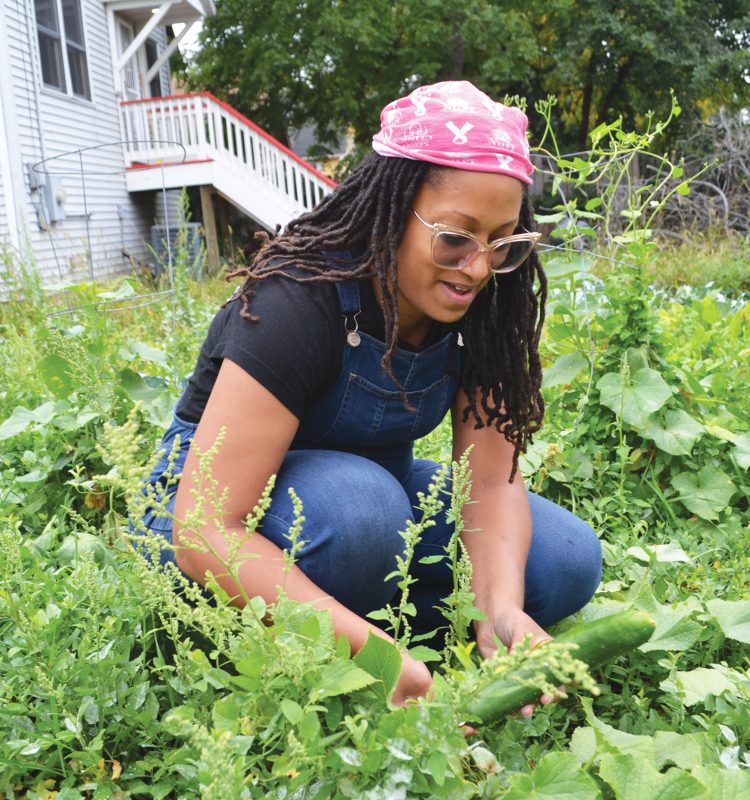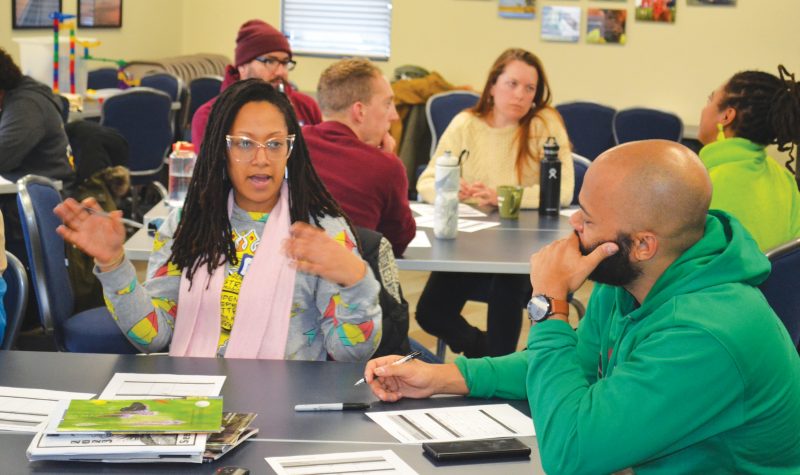On a warm, overcast day in early fall, a low line of shrubby trees blocks the view of a seemingly empty lot on Penn Avenue, a busy thoroughfare in the Willard-Hay Neighborhood of North Minneapolis. A television with a cracked screen lays in some weeds at the edge of the lot, a reminder that if you don’t do something positive with a blank spot in the urban map it will be used for something not quite so positive. But on this day Queen Frye is proving that not only is this piece of ground between two houses not empty, but it’s also the home of something that’s benefiting her as well as the community at large.
“We have Swiss chard, cauliflower, purple cabbage, cucumbers, sage, collard greens, banana peppers, basil, lavender, mustard greens, kale, Brussels sprouts, and cantaloupe,” the energetic 39-year-old says as she provides a tour of the riot of growth taking place.

As a Black woman living in an urban setting, Frye is well aware that she doesn’t fit the “Old MacDonald” farmer stereotype of being a white man residing in a rural area. But she also knows that she grew up valuing raising her own fresh vegetables, creating a family legacy built on healthy eating and self-sufficiency. Now, thanks to her exposure to goal setting and holistic planning through the Land Stewardship Project’s Farm Beginnings course, Frye says she’s prepared to take her personal passion for food and farming to the next level and help build resiliency in the wider community.
“How can this garden space be a place of peace, be a place of building community, restoring relationship, sharing art, helping with our food system in North Minneapolis?” Frye asks while showing a freshly- picked pepper to Gustavo, a neighbor across the fence who’s in the midst of replacing his roof.
Family Legacy
Frye calls herself a “generational urban farmer” — when she was a little girl in Boston, she helped her grandmother, Gertrude “Trudy” Fernandez, work a plot in a community garden. “She never talked about things like we talk about with gardening today, about it being revolutionary and sustainable — it was just part of our life,” recalls Frye of her grandmother.
After Frye’s family moved to Minneapolis in 1989, they continued that gardening legacy. Every time they’d move, one of the first tasks was to dig up a rectangular plot in the backyard to raise vegetables in. Frye’s mother, Anna Frye, along with aunts, continued that tradition after the grandmother passed away. Frye, in turn, has passed on the gardening bug to her teenaged daughter and son. “Wherever we lived, we always had a garden,” she says.
After her mother passed away, Frye felt the need to preserve the relationship between land and food production she inherited from her family. So, in 2019, she and her partner, Michael Kuykindall, started R. Roots Garden, a nonprofit that’s growing vegetables at various locations, including on this empty city lot and at a school in the community. R. Roots is based on the idea that everyone deserves access to fresh, healthy food. That mission takes on a special resonance in an area like North Minneapolis, where fast food restaurants and convenience stores dominate the food landscape.
“Yeah, maybe we don’t need fried chicken 10 different ways in one mile stretch,” Frye says with a laugh.
She’s also committed to teaching others how to raise food in an urban area on a limited income. That’s why R. Roots does community educational outreach and has partnered with the City of Minneapolis’s Step Up program to work with interns.
Today, R. Roots is raising an impressive amount of vegetables on small plots of land, despite numerous challenges. For example, Frye laughs at the time she planted a vegetable plot and suddenly realized she had no access to water. She drove to a local Aldi grocery store and bought gallon jugs of water to do some emergency irrigation. Other challenges include lack of financial resources, inconsistent access to land, social upheaval in the wake of the murder of George Floyd in South Minneapolis, and serious health issues on the part of Frye. The vegetables produced by the urban farming operation are distributed locally and Frye is constantly in search of ways to improve not only how she raises food, but how she sets up a system that engages others in gardening and healthy eating. Over the years, she’s enrolled in numerous classes, including the University of Minnesota’s Master Gardener program.
Farm Beginnings
So perhaps it’s not surprising that during the winter of 2022-2023, she and Kuykindall enrolled in LSP’s Farm Beginnings course. For the past quarter-century, Farm Beginnings has been offering training that focuses on the goal setting, marketing, and financial skills needed to establish a successful farm business. Through the class, LSP organizers introduce students to holistic business planning. In addition, established farmers, as well as experts on farm financing, marketing, and other topics, give in-depth presentations.
Frye, who has worked in the accounting profession, says Farm Beginnings not only supported her as she strategized how to structure R. Roots Garden as an entity that will be sustainable in the long term from an economic and quality-of-life point of view, but helped her see ways of making the enterprise a bigger part of the community. The class also helped Frye connect with other farmers who are interested in producing food in a way that’s good for their neighbors and the land.
Frye says one of the things that prompted her to take Farm Beginnings was that she was becoming increasingly aware, in the midst of the COVID-19 pandemic and the death of George Floyd, of all the conversations taking place around food justice and the role farming could play in building more resilient urban communities. She started meeting with other urban farmers and realized she wasn’t the only one thinking about the bigger role food production could play in the community.
“Hearing people in a group actually talking about it, I was like, this really just isn’t a me thing—there are people who are seeing the same things I’m seeing in the neighborhood and want to do something differently.”
The farmer-to-farmer information model that is at the core of Farm Beginnings relieves the stress that can come when one is sitting through a presentation given by an accredited expert — someone Frye describes as “Mister PhD.”
“In Farm Beginnings, we’re learning from each other,” she says. “You have that feeling of, ‘They don’t even have a degree and they’re doing this?’ You relax your shoulders a little bit.”
Frye says Farm Beginnings, and the extra deeper dive into holistic planning she took as part of the course, came at a time when she was trying to strike a healthy work-life balance. Health problems had made it clear that she would need such a balance if this is something she is going to pursue in the long term.
Frye remembers one farmer-presenter who talked about the additional elements needed in farming that go beyond just agronomic or business acumen — a farmer’s physical and mental health is just as key as fertile soil if the operation is to thrive in the long term. “It was almost like talking about having realistic boundaries set for yourself when it comes to business and when it comes to your personal life, because she really touched on when you are a farmer, you are your own business,” recalls Frye.
The urban farmer thinks a lot about how to make what she’s doing resonate with others in a kind of create-your-own adventure sort of way. Even the name of her enterprise, R. Roots Garden, has that quality to it.
“ ‘R’ is for whatever ‘R’ word you have related to the garden — like how it makes you feel,” she says while sitting at a picnic table at the edge of the Penn Avenue plot. “It could be ‘rest,’ it could be ‘relaxation,’ it could be ‘redemption,’ it could be ‘redesigning.’ ” She asks me, “Does any ‘R’ word resonate with you?”
“Resilience?”
“Yeah,” says Frye.
Always Another ‘And’
To Black people in America, agriculture has long been associated with slavery, or in more recent years, discrimination on the part of the USDA and other government agencies, as well as lending institutions.
A century ago, there were an estimated one million Black farmers in the U.S. Systemic racism, unfair USDA policies, discrimination on the part of lenders, and land title disputes, along with general economic challenges in agriculture, have combined to whittle that number down to less than 42,000 Black farmers, owning less than 1% of the country’s farmland. Farms with at least one producer reporting as Black decreased by 13% between 2017 and 2022, nearly double the percentage of overall farm loss, according to the U.S. Census of Agriculture. (The Ag Census reports that 95 farmers in Minnesota identify as Black.) Part of the decimation of people of color involved in agriculture as full-fledged entrepreneurial farmers can be traced to the stress injected into the system by racism — institutional and the day-to-day interactions that take place in a community.
Frye acknowledges that it can be exhausting to, as a Black person, not be able to just focus on farming. “It gets challenging sometimes because you know there are people who are just growing food — they don’t have to deal with the and, the but, the however, the furthermore,” she says.
Frye says she’s not going to allow such barriers to get in the way of her passion for farming and thirst for knowledge. She has gotten used to being the youngest person, as well as the only Black person, in the classes and workshops she signs up for. “I’ve learned to be comfortable in those spaces and be like, ‘I’m here to participate and receive information.’ And if somebody in that classroom doesn’t want me to be there, they’re going to have to get up and leave, but I’m staying,” the farmer says.
And while she stays, her plans call for increasing the farm’s education and community outreach capacity, and adding infrastructure such as toolsheds and a packing shed. And always, always, doing something positive with an empty city lot. The pressure is on, in a good way. R. Roots gained access to the plot on Penn Avenue in 2019 when a property owner put out the word that he was “looking for somebody to do something good on this land.” Frye gave the owner a presentation about her plans and he agreed to allow her to grow food there — temporarily; he made it clear his long-term plans included developing the lot.
The farmer’s response? “Well, I hope that we grow our garden so well that you do not want to develop there.”
This profile was originally published in the No. 1, 2024, Land Stewardship Letter.
